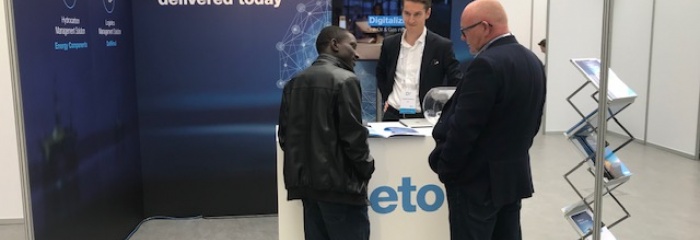Kristian Brakvatne, Director of Tieto Oil & Gas, Operations Support Solutions talks about the most efficient approach to digitalisation and the benefits that collaboration across the industry can bring.

How can we ensure that digitalisation will lead to more efficient operations?
I think that in order to operate more efficiently by use of digital technology you need to go at it in that order, first identify an area of improvement and then look for relevant technology.
Today it is so easy to get triggered by amazing new technology, and then try to fit it into your operations, but those who do digitalisation in that order will be struggling.
For me, efficiency is all about being able to produce more with less resources. In order to do so, the key is to understand the actual production and then pair that with insights into the technological landscape to come up with good solutions.
How can stakeholders in O&G benefit from collaboration?
To benefit from collaboration in the long run you need to create good arenas and ecosystems for collaboration between stakeholders in the oil and gas industry. Such ecosystems can come in many forms, but the core of it for me is to bring together people of deep business understanding with skilled technologists.
This can be taken one step further by involving start-ups, academic institutions and even representatives from other industries to challenge status quo and share learnings and best practices across.
What are some examples of good collaboration?
Back in the nineties when the oil-price was below 20 $/Barrel, the operators on the Norwegian Continental Shelf looked to standardisation and collaboration as sources of more efficient operations. The result was the DaWinci application, which started out as a tool designed to facilitate sharing of helicopter resources amongst operators.
Today, DaWinci has become a logistics platform now commonly referred to as DaWinci Industry Hub. It has in essence grown into an ecosystem bringing together all stakeholders of the oil and gas industry on the Norwegian Continental Shelf – be it operators, suppliers or transporters.
In 2017 we launched DaWinci Industry Hub Qatar, in turn bringing together the whole industry in Qatar on one common digital platform – replicating the success once again.
One incredible aspect to this type of collaboration is that not only do the respective operators benefit from a lower logistics cost, it also reduces the carbon footprint of their operations overall.
What trends should we expect in the next 5-10 years?
I strongly believe that the world is heading in an ‘as a Service’ direction.
In the space of logistics that means that in 5-10 years the complete industry logistics may be done ‘as a Service’ – meaning that all personnel and cargo needed offshore out of Aberdeen is accumulated and optimised along a smaller fleet of transportation resources than each operator would have had separately, and then delivered accordingly.
Furthermore, collaborating across the North Sea and look at regional distribution of transportation resources would be adding another dimension to such a setup.
Sign up
Signup to receive the latest news from Future Oil & Gas directly to your inbox
Stay informed about events, speakers and programme and get the news and insights from the cutting edge of digital technologies servicing the oil and gas industry.












Anonymous / 11-Jun-2019